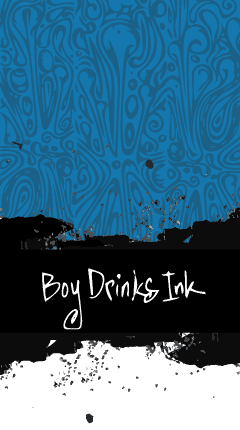
Aesop Rock
The Impossible Kid
Album Release Date: April 29th, 2016
The Impossible Kid cover design by Alex Pardee - Rhymesayers Entertainment 2016
In 2012, there was a study of rapper vocabularies in which the first 35,000 lyrics recorded by dozens of emcees were analyzed to discover the greatest number of unique words used by each. Not surprisingly, Aesop Rock was way out in front with 7,392 unique words used, with the next closest being Wu-Tang's GZA with 6,426 unique words. One of the most dynamic rappers around, Aesop Rock's lyrically dense music abounds with poetic imagery, abstract metaphors, obscure references, and rich wordplay. The Impossible Kid, Aesop Rock's 7th full-length solo release, continues his unique brand of labyrinthine lyrical content and frenetic yet focused energy.
One of my all-time favorite HipHop albums is Aesop Rock's masterpiece Labor Days (2001). With hypnotic flows of concentrated lyrical wizardry, it signaled his arrival as an unparalleled rhyme mastermind. The best songs on that album ("Daylight", "No Regrets", "Battery", and "9-5ers Anthem", to name a few) play as profound street fantasy poems, emotional odes, and strange tales reflecting the poignant complexity of urban life for modern American youth.
While by no means tame, Labor Days and Aesop Rock's earlier album Float (2000) had a generally more traditional HipHop aesthetic than his future works—especially production-wise—with bass-heavy, hard-hitting yet dreamy and melodious beats. But then he started to change his sound, as Bazooka Tooth (2003) and None Shall Pass (2007), his 4th and 5th albums, veered away from the potency of songs like "Daylight" and more towards raucous electronic beat production. This culminated with Skelethon (2012), Aesop's previous solo album, which secured his entry into heavier electronic rap music territory. Aes has handled the production on his albums a lot more post-Labor Days—and The Impossible Kid is the first album of his own that he's handled it entirely by himself (although he mostly did it on Skelethon, too). He also produced the beats for Felt's 3rd album—their most strident to date. So he's obviously into that hard electronic sound. With electric shock intensity and unfettered lyrical fervor, Aesop Rock's post-Labor Days music has often danced the parameters of an odd variety of calculated cacophony; cerebral rhymes overlying frenzied soundscapes.
But with The Impossible Kid, Aes dials it back a bit from those previous few albums. It still maintains a similar off-kilter, sometimes dissonant sound, but it's slowed down, less noisy, and the beats are rawer—stripped-down, head-nodding groovers. The first track "Mystery Fish" opens with the lines "Tech support, feral army / In a cave on a failed bit of terraforming / Four corners of paranormal / Get shorn for a thermos and a pair of thermals". So he immediately shows that he's still as loquacious as ever, if also just as cryptic. It's been called Aesop Rock's most personal album to date, rapping a lot about himself; "Blood Sandwich" is about his two brothers, "Kirby" is about his cat, and the bangin' "Rings" (with an awesome surreal video) about his love of drawing. Amidst the album's barrage of enigmatic lyrics, meaningful lines emerge: "Knowing ain't half the battle / That's a bullshit quip written by some asshole / You can own what you are / And still sit around stoned in your car". This song, an album highlight, ends with the edict "Get Out of the Car", which is also its title.
Aesop Rock's never written simple songs, and it often takes repeated listens to decipher the verbal puzzles he crafts. Such has been his appeal on his best work, but here it's sometimes alienating more than alluring. What The Impossible Kid and its two or three predecessors lack is that perfect interplay between compelling backing music and eloquent, poetic wordplay that Labor Days captures so well. Aes has rarely displayed that balance of ingredients as impeccably since then, supplanting emotional vibrancy with a cold intellectual quality and a sometimes monotonous aural experience.
Don't get me wrong, Aes has never fallen off in terms of slacking creatively, and remains one of the illest rappers around. But it would be interesting to see him work with a producer who can rein him in a bit, as all too often his music overflows with esoteric verbiage. Depending on one's mood, it may feel a bit too intricate, subliminal, and elusive at times. I like hard and loud shit, and weird shit, but this is difficult to wrap my head around for too long in one sitting and almost hurts the brain at times. On the other hand, when more conventional HipHop starts to get tiresome and I feel like I want to be challenged by something with curious lyrics that aren't always easily understood, I might put on a more recent Aesop Rock record like Skelethon or The Impossible Kid.
For fans who like the discordant electronic sound that Aesop Rock has continued to explore, The Impossible Kid won't disappoint. One thing is clear: he puts a lot of work into his recordings, and as such his albums require work from the listener as well, to fully appreciate. This is much better, and makes for a much more textured result, than a lot of lighter HipHop fare that doesn't require much effort to absorb. Such is not the case with Aes and this album though, as it constantly challenges. So if you like hard, serious rap music, it is pretty dope overall—although not easy. After all, it is called The Impossible Kid. I wouldn't go so far as to say the album is impossible, as there's definitely some crazy-ass rap out there that stretches the boundaries of the genre far more than Aesop Rock does—but I'd certainly call him a difficult and talented kid. And he still has as big a vocabulary as ever.
• Nik Dobrinsky / Boy Drinks Ink
May 7th, 2016


